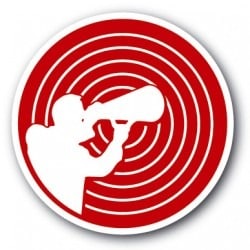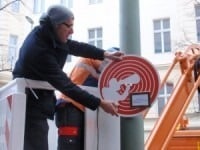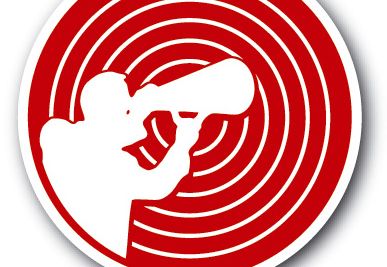Since Thursday, the voices of people with Aids have been heard on the streets of Berlin. As if out of nowhere, they talk about life with the disease. This can lead to irritation

There are things that don't exist, and the best ones can be found in police reports: "This morning, at around 04:00, several citizens independently complained to the police by telephone that the traffic lights in Kastanienallee/Schönhauser Allee were talking loudly to passers-by."
Where did we get this message from? From the blog of "Voices in the city", the Berlin audio project for World Aids Day. The campaign gives people with Aids a voice in public - their own.
This is how it works: Loudspeaker stations are installed at 15 locations on Berlin's streets. The symbol of the campaign - a man with a megaphone in a red circle - points the way. Passers-by can hear the voices as if from a distance. A large circle with the logo on the pavement marks the area where they can be heard loud and clear. They sound from a height of four metres, as if from nowhere.
It's easy to believe that the traffic lights have started to speak. But why did people call the police instead of just listening? Perhaps because the fun stops when you get involved with the voices.
Anneliese then talks about how she was infected with HIV through rape. Eva, who became infected as a drug user, describes how her mother used to wash the cup she used with vinegar and the difficulties she had to go through as an HIV-positive mother.
Paul, who is gay, tells how he lived alone in his one-bedroom flat for 17 years because all his friends had died. "I thought you'd find a partner again and then you'd stay together. But that's not the case. They always just want to fuck you and then they don't know you the next day." Until his death last year, Paul lived in the "Zu Hause im Kiez" (ZiK) housing project and gave a positive summary at the end: "I lived, I loved. (...) I saw a lot of the world and I didn't miss out on anything."
Six people have their say in "Voices in the city". Their reports are each ten minutes long and run in endless loops at the audio stations until 8 December - 24 hours a day.
These are life stories that have hardly been heard since the advent of HIV treatments. "People with AIDS are no longer the subject of media attention. They survive longer - and die more quietly," write the organisers of "Voices in the City" on the project's website. They want to prevent people with Aids from being forgotten.
The background: AIDS can generally be avoided today if you were infected with HIV not too long ago, find out about it in good time through a test and start taking HIV medication at the right time. But those who have been positive for a very long time sometimes benefit less from the medication. Their health has often already been severely damaged or they are struggling with resistance to the medication. This year, around 760 people in Germany have contracted AIDS and 550 have died as a result of the infection.

The idea for "Voices in the City" was born during the Berlin AIDS service organisation's "Krankenreise", after interviews for sponsors of the trip were recorded there. Doctor Christoph Weber from Berlin's Auguste-Viktoria-Klinikum (AVK) and cultural scientist Martin Kostezer then sought and found numerous supporters. Former Federal Minister of Health Ulla Schmidt (SPD) took on the patronage. "I thought it was a great idea. Better than posters!" she said at the opening event last Wednesday in Berlin's Axel Hotel.
Posters, you could say, don't appeal directly to passers-by - at least not from above in the middle of the night.
Incidentally, the loudspeaker system in Kastanienallee was confiscated by the police following the complaints. According to the campaign blog, it was returned shortly afterwards with a verbose apology. Because the voices in the city are, of course, officially authorised.
(Holger Wicht)
Directly to the voices (audio files on the project website)
Report in the blog of Deutsche AIDS-Hilfe










